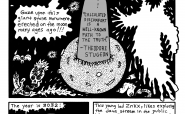| Umělec magazine 2010/1 >> A reevaluation of reevaluations | List of all editions. | ||||||||||||
|
|||||||||||||
A reevaluation of reevaluationsUmělec magazine 2010/101.01.2010 Palo Fabuš | editorial | en cs de |
|||||||||||||
|
We have just had the end of a decade, with all the requisite media retrospectives and reevaluations. Although the tendency to review and analyze has been ascribed to the entire modern era, it would seem that there has been an upsurge in looking back into the past. It has been said that the 20th century came to a close with the events of September 11, but we still seem to be coming to terms with its end to this day. I am thinking about the globalized environment in which the tremors emanating from the centers may be weaker, but in places like Eastern Europe they still resonate with the memory of the political changes twenty years earlier. One feature of globalization is ubiquity, a concept that can be explained in any number of ways and which in recent times some of the loudest technophiles have adopted as their banner. In its ambivalence, however, it is like writing on the wall which we don’t know is an honest warning or just needlessly frightening us. But since we are on the subject, let us summarize: apoliticality and the politicalization of the everyday are but two sides of the same coin; art no longer produces any isms and, as a result of insatiable aestheticization, has become merged with life; the amount of music being produced and listened to is directly related to the lack of new musical legends; the fatally discredited institution of advertising finds refuge among seemingly innocent discussions among friends; the boundary between the public and private is disappearing; multimedia has occupied the last empty spaces in our daily life and it has become practically impossible to separate work from free time. Just as collectors collect only because of their passion for collecting, history – as the collection of images and ideas – has no meaning on its own. In giving it meaning and purpose in the past, people tried to build a bulwark against chaos – which it ineluctably is if we strip it of the human dimension. Fear of chaos is the fear of the too-rapid cycle of creation and decline that we sometimes feel today. But like ignorance, the accumulation of historical memory requires limits as well. Reevaluations of any kind tempt one to a make a clean break, to engage in the modernist compulsion of looking for universalism and a new direction, to ask Chto delat, and to neurotically grasp at impersonal ideals and pre-chewed labels. I am not suggesting that we leave things to run their own course – quite the opposite, in fact. We may be tempted to do so by our autopilot – because of the guardrails and directional arrows posted for me by others. I am talking about a return to personal responsibility, to the self at the center of a shared universe – a responsibility that needs to be repeatedly pulled out from underneath the accumulated deposits of ubiquitous images. If we postpone our life in the hopes that it will somehow find its own way to us, then we place the world in which we live into the hands of others... forgetting that “those others” is us as well.
01.01.2010
Recommended articles
|
|||||||||||||







Comments
There are currently no comments.Add new comment